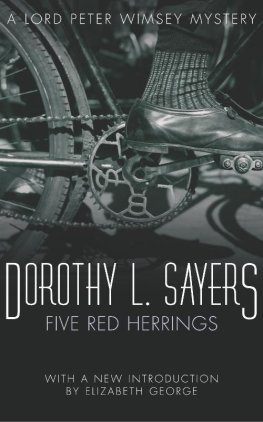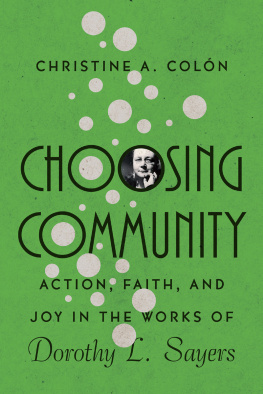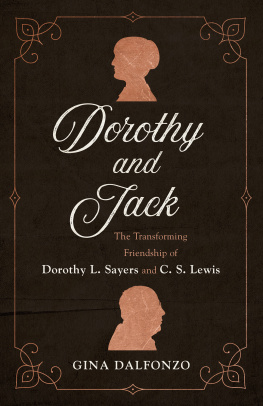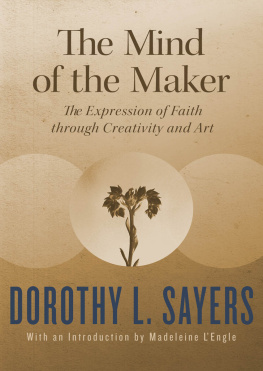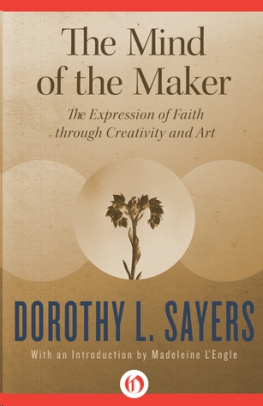Subversive
Christ, Culture, and the Shocking Dorothy L. Sayers
Crystal L. Downing
Broadleaf Books
Minneapolis
SUBVERSIVE
Christ, Culture, and the Shocking
Dorothy L. Sayers
Copyright 2020 Crystal L. Downing. Printed by Broadleaf Books, an imprint of 1517 Media. All rights reserved. Except for brief quotations in critical articles or reviews, no part of this book may be reproduced in any manner without prior written permission from the publisher. Email copyright@1517.media or write to Permissions, Broadleaf Books, PO Box 1209, Minneapolis, MN 55440-1209.
All Bible quotations are from the New Revised Standard Version, unless otherwise noted.
Permission to quote the works of Dorothy L. Sayers has been granted by David Higham and Associates Limited.
Cover design and illustration: James Kegley
Print ISBN: 978-1-5064-6275-2
eBook ISBN: 978-1-5064-6276-9
This book is dedicated to Christopher Dean (19322012), Chairman of the Dorothy L. Sayers Society from 1994 to 2012, who inspired me, as he did many others, with his passionate intellect and gracious encouragement
Contents
Subversive was ignited not only by the shocking insights of Dorothy L. Sayers but also by people who encouraged me to apply those insights to pressing religious and political issues today. Acquainted with my first book, Writing Performances: The Stages of Dorothy L. Sayers (2004), Gina Dalfonzo asked me to write a short essay for Christianity Today about Sayerss contemporary relevance. Published in June 2018, the essay caught the attention of Emily King at Fortress Press, who suggested I consider composing a book on various ways Sayers might speak to people in our own era. By providing helpful feedback to my first draft, Emily has made this a much better book. Any remaining deficiencies are my own.
Subversive has also benefitted from invigorating conversations with colleagues at Wheaton College. I especially want to thank Tiffany Eberle Kriner for asking me to present an early chapter from Subversive at a college Humanities Colloquium, where I received encouraging and helpful responses. Several attending the colloquium went above and beyond the call of duty: Timothy Larsen met with me to discuss nuances about Christian history in my second chapter; Laura Yoder agreed to read and respond to my fifth chapter; and Christine Coln energized my thought, not only in multiple conversations, but also through her two books on Sayers. In addition to my colleagues, Sayers scholar Kathryn Wehr guided my understanding tremendously.
Equally important were the practical help and emotional support of the staff at the Marion E. Wade Center at Wheaton, which houses the worlds most comprehensive collection of published and unpublished letters, papers, and books by and about Sayers. Wade Associate Director Marjorie Mead, herself a Sayers scholar, helped me get permissions to quote Sayers; Wade Office Coordinator Shawn Mrakovich, along with her husband, Pete, drew my attention to unpublished documents in which Sayers grapples with political issues, and Shawn also helped construct the index; Wade Archivist Laura Schmidt made available to me every published and unpublished Sayers item I needed; Aaron Hill, editor of the Wade journal, VII, constructed the chart for chapter 4 and encouraged conversations about Sayers for the Wade Center podcast, which he produces; Wade work-study student Leah McMichael helped with proofreading and citations. Finally, Operations Manager Mary Lynn Uitermarkt, Office Assistant Hope Grant, and Cataloguer Jill Walker provided listening ears and words of encouragement. I am fortunate to work with such an intelligent and conscientious team at the Wade Center, where I serve as codirector with my husband, C. S. Lewis scholar David C. Downing. He is my prime source of happiness, not only in the job, but for life itself.
3
Introduction: The Murder of God
When Dorothy L. Sayers died in 1957, C. S. Lewis wept. Though she sometimes sharply criticized his opinions, Lewis delighted in Sayerss ability to communicate subversive perceptions in snappy, sometime hilarious ways, even if at his expense. In fact, when asked near the end of his life to name authors that influenced his spiritual life, Lewis identified four: two specialists on mysticism, G. K. Chesterton, and Dorothy L. Sayers.
So why is C. S. Lewis a household name in the US, while Sayers remains largely unknown? Born five years apart, both achieved honors while students at Oxford University; both wrote best-selling novels while remaining serious about high-level scholarship; both influenced thousands of people to follow Jesus through 1940s radio broadcasts; both were awarded honorary doctorates; both have been praised by professional theologians for their provocative advocacy of Christian faith. Students at Oxford University and UC Berkeley were writing theses about Sayers long before Lewis became the focus of university study. Its no wonder that Lewis called Sayers the first person of importance who ever wrote me a fan letter. What happened to that importance?
By the end of this book, I hope to have answered these questions. But first I mean to intensify them by demonstrating that Sayers is even more relevant today than when Lewis wept over her death. Subversive explores and celebrates Sayerss theological brilliance, showing how her searing insight and cheeky wit can enlighten not only hesitant seekers but also long-time Christians in the twenty-first century. As the label evangelical alienates more and more people in our own era, Sayers can guide Christians through cultural minefields, providing direction to those wary of belief and weary of evangelical language.
The Mocking of Christ
Though she never renounced her childhood faith, Sayers felt the wariness and weariness many report today. She would perfectly understand twenty-first century nones: the name given to younger generations who mark none on official forms asking them to identify their religion.
A poem Sayers wrote during her teenage years expresses how many adolescents feel today. Called The Gargoyle, it describes a carved figure at the end of a church rain gutter that spouts water through its open mouth. Comparing the gargoyle with a preacher who Spouts at his weary flock inside, she concludes, I like the gargoyle best, since preachers can be awful dampers when theyre dry.
Sayerss criticism of Christian practices was far less playful by her mid-twenties. In a dramatic poem called The Mocking of Christ (1918), she presents various ways so-called believers have treated Jesus throughout history. Inspired by the verse that states where two or three are gathered in my name, I am there among them (Matthew 18:20), the poem shows Jesus in the presence of people who do self-serving things in his name. For example, when a medieval pope fights a king over political power, both accidentally punch Jesus as they come to blows. After wresting control from the church, the king proclaims, Who keeps quiet and serves the King / Cant go wrong in anything: another way of saying I am the best leader for your country and will tolerate no criticism. Later in the poem, a similar antagonism arises between two patriots, both of whom claim that Jesus endorses their opposing political causes. As the nationalists argue about which party is more Christian, Jesus is splattered by their spit, thus mimicking mockers at the foot of the cross.


